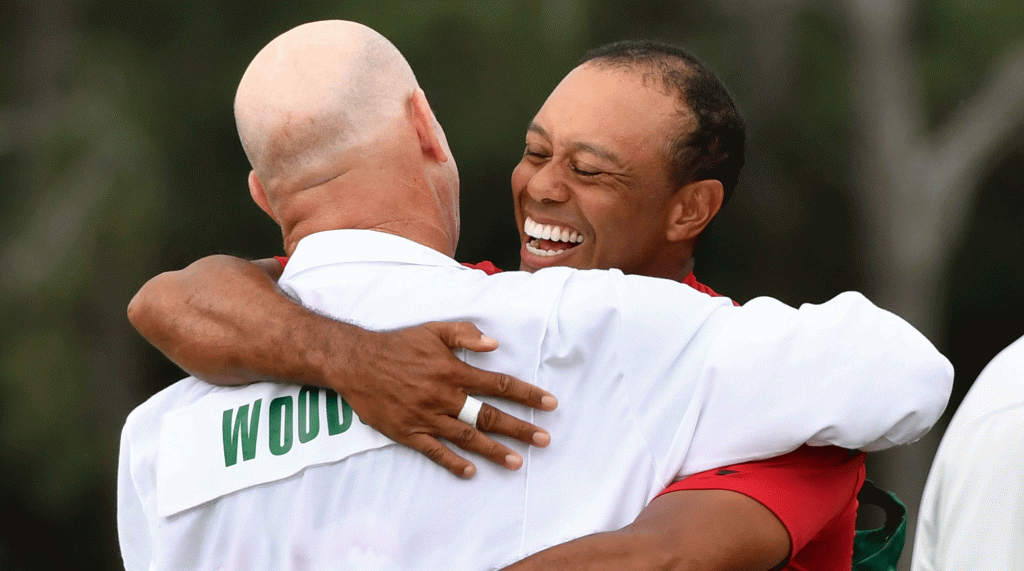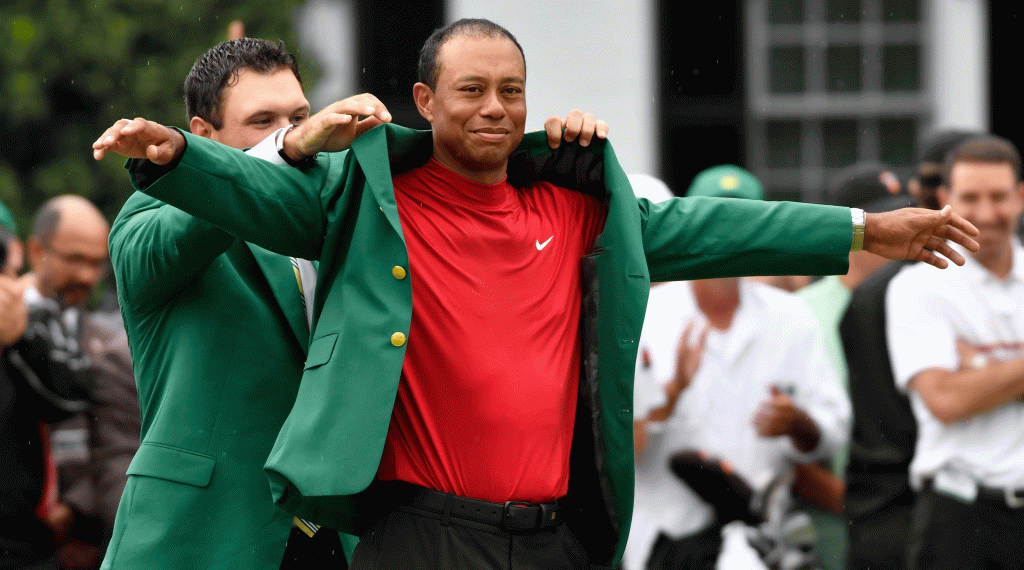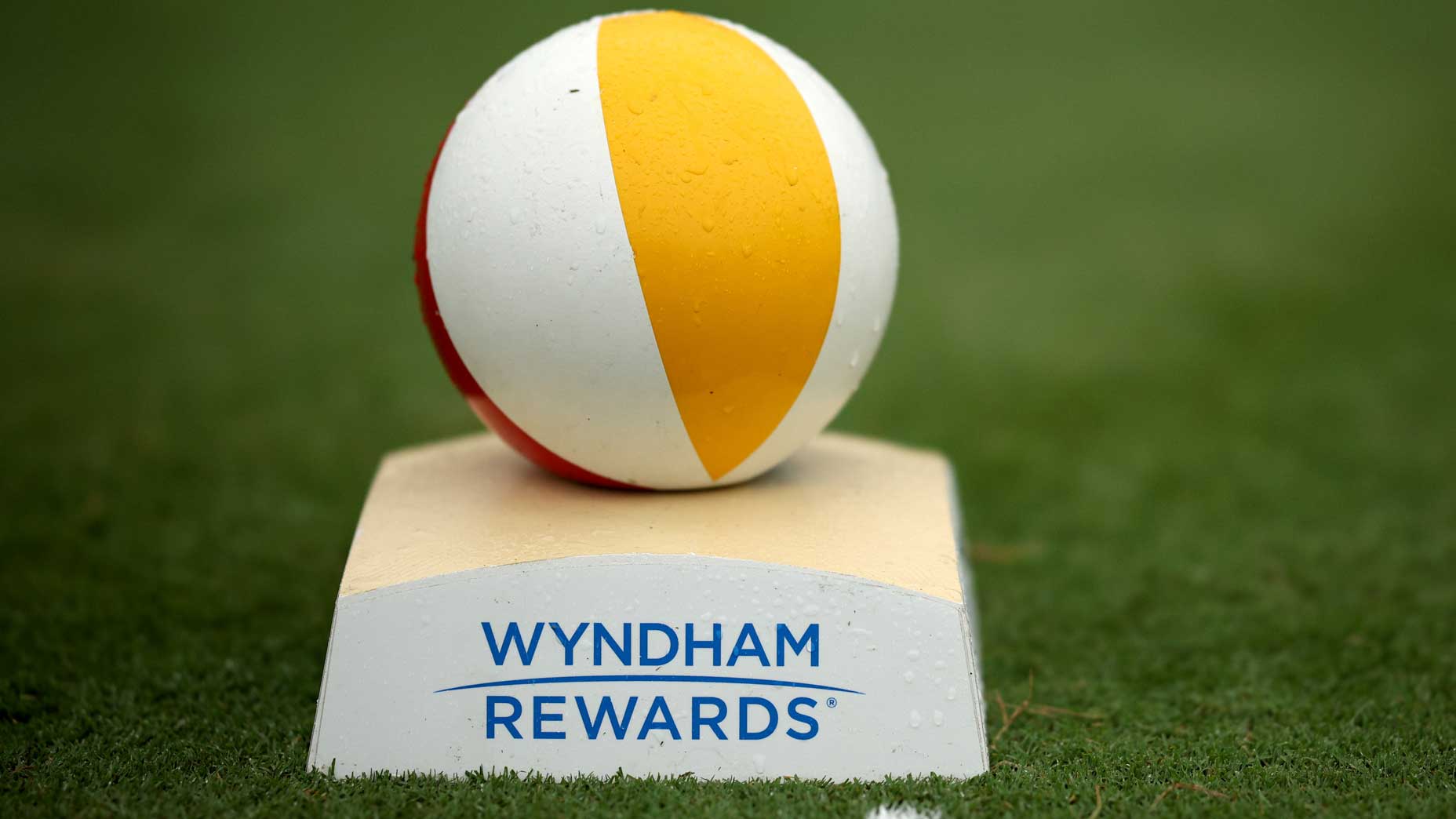AUGUSTA, Ga. — In 1986, Jack Nicklaus, at age 46, won his record 18th major championship, on the fabled course here. On that same Sunday, 33 years ago and in suburban Southern California, Tiger Woods, age 10, watched the Masters for the first time. Eleven years later, as golf’s ultimate prodigy, he won the tournament. It was his first Masters win and his first major title. On Sunday, he won it again, his fifth Masters win and his 15th major title. In ’86, Big Jack turned back the hands of time, for a final time, as it turned out. Ever since, 18 has been golf’s holy number every which way to Sunday. Tiger’s victory on Sunday, at age 43, was completely different. This was the first major victory of his reconfigured life.
Or, as Brooks Koepka put it, “I think 18 is a whole lot closer than people think.”
Time will tell. In the meantime, there is only one person who can win the Grand Slam this year. And there is only one person who has won majors where the next two majors will be played, Bethpage Black for the PGA Championship in May and Pebble Beach for the U.S. Open in June.
There’s something about Augusta National that promotes sentimentality. The course has an exalted reputation for what has happened on it and because so many fans who make the April pilgrimage to it came formerly with their parents or friends of fellow enlistees. In other words, the love for it — our love for it — is baked-in. That even holds true for Tiger. He watched the tournament with his father. He fell into Earl’s arms when he won here by 12 as a rookie pro. Then, when he won by one on Sunday, Tiger’s son, Charlie, was waiting for his father in the wings. Seconds later, Tiger said to his mother, Tida, “We did it.”
No, Tida didn’t flush that 8-iron to a foot on 16, the shot that sealed the deal. But she drove him to a thousand junior events and lessons and practice rounds.
The kids on Tour – Justin and Jordan and Xander and what’s-his-name – all grew up Tiger. They worship Tiger. But they’re not like Tiger. They’re all about team. Go Team! Tiger doesn’t use the word we, not in public. Yes, there’s a small, tight team around him: his agent, Mark Steinberg; his caddie, Joe LaCava; his wingman, Rob McNamara; his girlfriend, Erica Herman; his equipment whisperer, Mike Taylor. A few others, largely unknown, trained professionals who tend to his contracts, his body, his head, his estate, his boat, his foundation. On it goes. But it all begins with Tiger’s otherworldly desire, a desire, and a veins-in-the-neck intensity, that brings to mind not Jack Nicklaus in his 40s, but Tom Brady, in his.
Woods didn’t go into a time-warp here. What he did was more astounding, really. He did the work and then played the rounds. You can start the clock two years ago, when he had fusion back surgery. All the before-sunrise trips to the gym since then. The ice baths. The range sessions, now more efficient than they have ever been before. The gratitude training, or the lessons in mindfulness, or whatever you want to call it. (Notah would know.) Yes, we’re talking about something that typically starts in grade school, the ability to say, and mean, sentences that begin with these three words: I’m grateful for . . . whatever.

This is obviously a meaningful development in Woods’ life, even if there’s little we actually know about it, except for this: At least once a week at his Tour events, and more than that this week at Augusta, Woods says this or something like it: “I’m just grateful to be playing again. Two years ago, I didn’t know if I’d even be able to play soccer again with my kids.” And now he was won the Masters, with a reengineered body and swing and head.
If he never wins another golf title in his life (and that seems unlikely), Woods has done something far more valuable for any of us interested in both the human condition and human potential. Woods lives by Churchill’s famous words, and he used them on Sunday, early, middle and late: “Never give up.”
Jack Nicklaus, for nearly a quarter-century now, has been a broken record on the subject of Tiger Woods: Never underestimate him. He said that when Woods started winning majors at a furious clip. He said it when Woods got stuck on 14 majors. He said it when Woods had health problems and legal problems and personal problems. It’s probably the single-most significant insight there could be into Woods. Never underestimate him. There is no quit in him.
What you’d love to know, and reporters attempted to get at it Sunday afternoon in the interview room here that feels more like a university lecture hall, is what drives the man at this stage, with all his wealth and all that he has achieved. Maybe the answer is beyond the reach of mere words, but it’s clear he has been determined to use golf to bury the scars of surgery and that heinous mug shot, that he would use golf to show his daughter and son the rewards of effort and to continue to devote himself to the thing that has defined his life: golfing excellence, golfing dominance, at levels the game has never seen before.
“I’m excited about show and tell at school,” Woods said Sunday night. It’s the most charming thing Woods has ever said at a press conference. His kids, Sam and Charlie, go to a school, the Benjamin School in South Florida, that three generations of the Nicklaus family has essentially populated and funded for decades. You may know that the Masters winner gets to wear his green coat in public for a year, until the time comes to defend the title. The last time Woods won the Masters, in 2005, he and his then-wife, Elin, were practically newlyweds and they had no children. Now they have two, and those kids are of show-and-tell age.

On Sunday, they were both on the course – cute kids! – with Erica Herman and Rob McNamara and others, dressed in the ritual colors (red and black) and wearing Frank the Talking Headcover baseball caps. Woods could not afford to look their way.
Between the ropes, he was ruthless, just as he was, to use his old phrase, back in the day. Francesco Molinari was even par through the day through 11 holes. Standing on the tee of the par-3 12th, he had a two-shot lead over Woods, who seemed like the most likely person to catch him. If you thought Woods had a chance to overtake him, you must be a whiz at the Amazing Kreskin Game. If you’ve been watching, you know the deal. To win at Augusta, you have to keep your ball dry on Sunday afternoon. Molinari’s tee shot on 12 landed on the unusually soft, long Fred Couples Bank that separates the 12th green from the still creek that fronts it. Fred’s ball stayed up and he won. Molinari’s slipped on down.
People cheered. Not many, but some. It was unfortunate, and not in the spirit that Bob Jones had in mind when he created this place in his image. More precisely, as an homage to all he felt was great about the game.
Woods does not particularly concern himself in these matters. Golf has always represented a different kind of journey for him, as it did for his father before him. The game and world was in a different place in 1986, and in 1975, when Woods was born, and a decade before that, when Lt. Col. Woods was in Vietnam, and the decade before that, when he was a black catcher and the other teams had all-white lineups. We all have our own long histories.
In any event, Woods could smell that blood in the creek from 130 yards away. He hit a pulled 9-iron that had one thing going for it: it was plenty long enough. People cheered like had had stiffed one. He made a superb two-putt for a par from about 50 feet. Molinari’s double-bogey there represented the first two nails in his 2019 Masters coffin, except for the fact that this is just golf, not anything like a life-or-death matter. (Jim Nantz! Love ya man but what’s with the undertaker tone in Butler Cabin?) If it takes four nails to secure a metaphorical coffin, Molinari hammered in two more on the par-5 15th, when he chunked his third in the water and took 7. Woods enjoyed birdie 4. The pond went red.
Then Woods nearly made that hole-in-one on the par-3 16th. From there he had a thousand-yard walk to redemption, or whatever you want to call this journey he’s on. A thousand-yard walk to Butler Cabin.
While he was doing that, Rob and Tida and Erica and Sam and Charlie and a few others were lodged in a corner table in the club’s cozy Grill Room, practically under a TV, oblivious to the many members and guests at the tables nearby. Tiger’s people weren’t celebrating. They know how golf goes. Yes, it was only last September that Woods won the Tour Championship. But it has been nearly 11 years since he won a major. And he had never won a major while not leading, or in a tie for the lead, after 54 holes. Plus, Brooks Koepka and Dustin Johnson and Xander Schauffele all had posted, or were on their way to posting, 12 under par. Woods, standing on the tee of the par-4 18th, said to himself, “Hey, it’s not over yet. Arnold lost the tournament with a double [here]. So let’s keep the hammer down.” He needed a bogey and he made a bogey.
While Woods was going up 18, Tida and Co., led by a club official, went from the clubhouse to the outskirts of the home green. Seconds after Woods holed out, Charlie was raised high in the air, secure in his father’s powerful arms. Mark Steinberg wiped away a tear. Mark Steinberg wiped away a tear!
Pandemonium, by the genteel standards of this club that is now teetering dangerously in the direction of Disney World, ensued. There were thousands of people stuffed between the clubhouse and the home green, with nothing to see but a giant scoreboard and the back of neck. The air smelled of cigar smoke and of the strange turf-drying agent that club uses, one that smells, as Nick Faldo said some years ago, like cow. Nobody cared.
Nobody cared about anything except being lost in the excellence of another man’s comeback and effort and, to be frank, success. Everybody loves a winner, right? That’s a repulsive statement. But maybe you could say the people, and surely millions more around the world, were swept up in it.
Tiger’s comeback is our comeback. He’s more likable now because of what he’s been through. Woods won, Jack Nicklaus told Golf Channel Sunday night, for one reason above all others: “He understands who he is.” There are layers of meaning in that short sentence.
You might say, if you like, that Woods has never been more appealing. That’s a statement on his body language and his actual language. His use of the word gratitude. The way he answers questions from reporters. The way he interacts, at least now and again, with fans. You could sense the remarkable level of warmth this week on the driving range between Woods and his former teacher, Butch Harmon, and there was a time they barely talked. Consider, if you will, his remarks at the Golf Writers Association of America dinner on the Wednesday before the tournament, where he won the Hogan Award, as the comeback player of year, for 2018.
We live in a world that venerates achievement, and Woods, and his life and times, is the embodiment of that. Well, the only thing that would have been more poignant than this win would have been a near-win. Yes, that’s an odd thing to say. But this journey Woods is on, he thinks it’s about winning and we think it’s about winning, but only because that’s how we’re trained to think. Just win, baby! But Woods has learned, somewhere along the way, that trying is an even worthier pursuit. Simply trying. Never giving up.
Viewed that way, this tournament was over on Friday night. Woods finished his second round late. The air was still and warm. He had shot an airtight 68. He was in total control of his golf and his mind. His worked had paid off. His kids could see that. We could see that. He could see that. People were standing and applauding for him that night as if he won, and he smiled — a huge, broad, natural, unaffected smile — that was practically screaming. He knew that people were responding to him, and he was responding to them, not on the basis of a 72-hole total, but because he was in it. Sunday was coming. Sunday was already written.
Michael Bamberger may be reached at michael_bamberger@golf.com.







